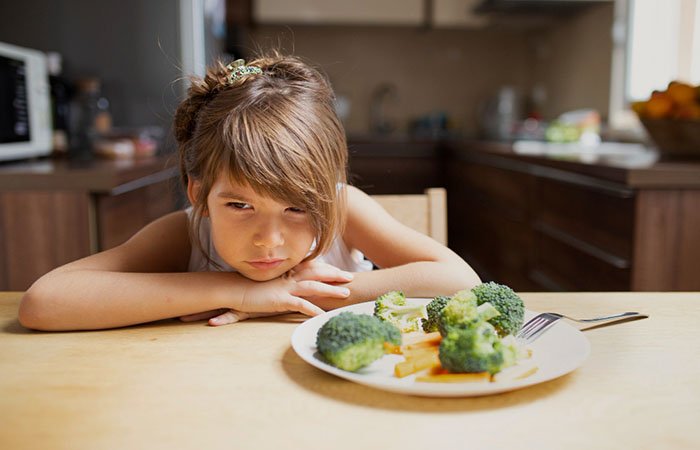How to encourage your kids to eat? If you’re struggling with a child who refuses to eat, constantly running around the house to get them to take a bite, this post is for you. If your little one shows no interest in swallowing food and runs away at the sight of rice but eagerly devours chips and fast-food, you’re not alone.
Babies start eating solid foods around 6 months of age. From 6 months to 1 year, they usually eat fairly well. However, once they start walking, many parents encounter the problem of their child refusing to eat. So, what can be done to solve this problem?

Image by Freepik
13 Strategy to get your kids to eat
1) First of all you need to understand one thing that the amount of food for children and food for adults is not the same. Your stomach has a much larger capacity so babies have much less. There are many mothers who will sit their children with 1 plate of rice and without eating it, their child will not eat or scold or even raise their hands on it, it is very bad to do. This causes the child to have an aversion to food and is fearful and anxious at the sight of food.
2) Let children eat with their hands. Usually after 6 months, babies learn to grasp with their hands and can give to their mouth. So teach children to eat with their hands. Prepare the food and put it in front. He will play and eat. Children love to imitate. So when you sit down to eat, try to have fun eating what food you want to eat. Children will be attracted to that food.
3) Practice feeding babies. It will strengthen children’s bones. However, it is better not to give cow’s milk to children up to 18 months. Sometimes cow’s milk triggers allergies in children due to which children get frequent colds. So goat’s milk is the best option for babies at this age. If the baby has digestive problems in milk then the baby can be fed packaged milk on the advice of a doctor or nutritionist.
3) Try to keep baby’s food colorful. It increases children’s interest in food. Interested in food.
4) Many of us cannot eat baby food ourselves. Test is not required. Remember that babies’ test sensation starts to build up from 7/8 months onwards. There’s no point in expecting your baby to eat something that doesn’t taste good to you.
5) Feed the child at least 1 egg per day. Many times children do not want to eat plain eggs. In this case, you can mix the egg with semolina, khichuri or other food. Or you can make egg halwa.
6) Add ghee to cooking baby food. Every 2/3 tablespoon of ghee will go a long way in your baby’s physical and mental development.
7) The most common practice in our country now is to feed instant noodles to small children. You don’t know how much harm you are unknowingly doing to your baby by eating these noodles. Monosodium glutamate in instant noodles weakens your child’s immunity, and also increases the risk of future diseases like heart disease, diabetes, cancer. Instead of instant noodles, you can feed the baby homemade noodles or buckwheat noodles.
8) Prevent children from consuming white sugar. Try eating raw sugarcane jaggery.
9) Many parents think that not eating rice means that the child is not eating anything. Rice does not provide any significant amount of vitamins and minerals apart from carbohydrates. So don’t worry too much.
10) Give the baby oily fish. Practice feeding small fish. Feed cow liver. Since chickens are fed a lot of feed these days, it is best to avoid chicken livers. But sometimes children don’t want to eat liver. In that case, you can feed the liver by mixing it with khichuri.
11) Keep away from outside food as much as possible. Especially the chips. It reduces the baby’s appetite and slows down brain growth. Try to make any food at home.
12) Due to lack of time, many mothers feed their children with mobile phones in their hands. It couldn’t be a worse habit. Play with the child. Give him books. Teach him to eat by pretending to play.
13) A very common problem of children is that they don’t want to eat the same food every day So try to bring variation in food It will increase the child’s interest in eating.
Remember that your child’s future depends on the food habits you develop now. If you do the above, hopefully your child’s interest in food will increase. There are also some disorders that affect children’s appetite and make children sick.


Joy of food
Kalami suggests shifting the focus towards fostering a positive relationship with food rather than fixating on restrictions, especially due to the impact of marketing and diet culture on misinformation about nutrition.
By promoting a mindset centered on balance, variety, and enjoyment of a wide range of foods, parents can help their children develop healthy eating habits and break free from negative associations with certain types of food.
Make sure your child drinks enough water to stay hydrated.
Ensuring children drink enough water can be challenging, especially when they are busy playing or doing sports. Kalami recommends making hydration fun by getting them a cute water bottle and giving water a more appealing name, like “sparkly mint water.” Explaining the benefits of staying hydrated for their performance in activities they enjoy can also motivate them to drink more water.
Encourage your child to become more self-reliant
Encouraging children’s independence is key to instilling healthy eating habits. According to Kalami, involving children in meal preparation and grocery shopping increases the likelihood of them adopting and maintaining healthy habits.
Starting with simple tasks like washing fruits and vegetables or observing kitchen activities, children can gradually become more involved in selecting recipes and preparing meals. Kalami suggests brainstorming ideas, shopping for groceries, and preparing meals together once or twice a week. This not only helps children develop curiosity and interest in food but also creates a positive overall experience.
Setting boundaries by guiding children to make good choices, such as including a fruit, a protein, and one “fun” food, helps them understand how to structure balanced meals for their activities and enjoyment.
Fixed time for breakfast
Having breakfast is particularly important for younger children, who are experiencing frequent periods of rapid growth. However, breakfast is still important for all age groups, including adults, as our bodies go through different shifts and changes. Starting the day with a nutritious breakfast provides fuel, consistent energy levels, and a more stable mood. It is recommended to have a family meal at the table whenever possible, as it has been linked to positive health outcomes.
However, breakfast can be enjoyed hot or cold, and it doesn’t have to be the very first thing in the morning or even at home. Sometimes breakfast happens when the child gets to school, and that’s perfectly fine. The key is to provide a balanced meal that includes protein, carbohydrates, healthy fats, and fruits or vegetables.
“Stay connected with us by following our website LifesPotion. Explore more and stay updated with the latest posts.”
